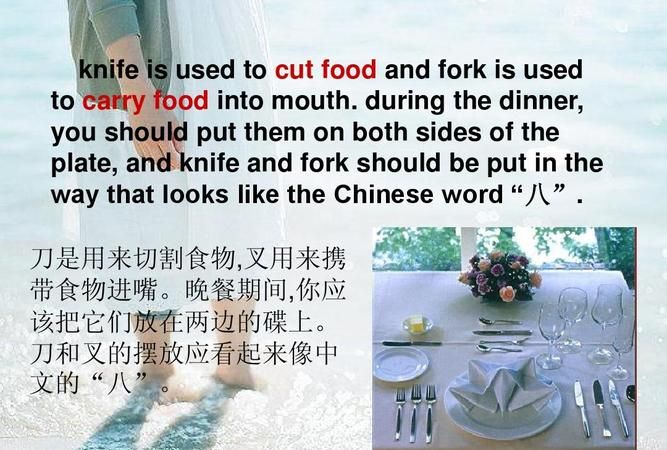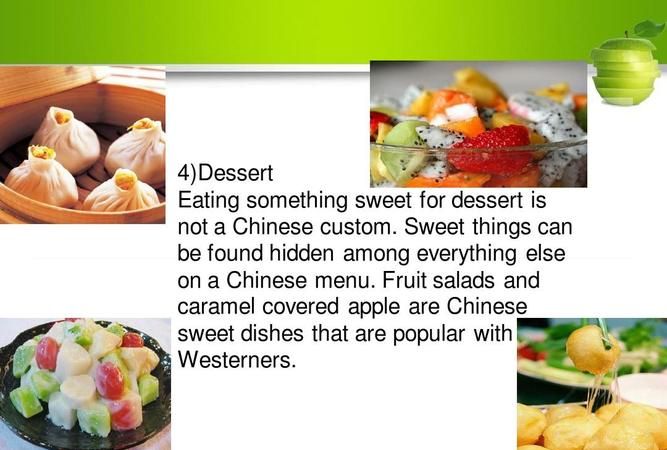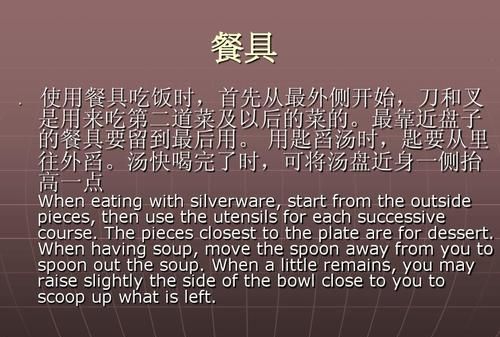本文目录
餐桌礼仪英语短语怎么写
看外国的餐桌礼仪用英文表达的话是如何的呢?你们觉得可以适应吗?下面是我给大家整理的餐桌礼仪 英语 短语 表达,供大家参阅!
餐桌礼仪英语(短语篇)
1) As soon as the hostess picks up her napkin(餐巾), pick yours up and lay it on your lap. Sometimes a roll of bread is wrapped in it; if so, toke it our and put it on your side plate.
2) The Soup Course
Dinner usually begins with soup. The largest spoon at your place is the soup spoon. It will be beside your plate at the right-hand side.
3) The Fish Course
If there is a fish course, it will probably follow the soup. There may be a special fork for the fish, or it may be similar to the meat fork. Often it is smaller.
4) The Meat Course
The main Course is usually served by the host himself, especially if it is a fowl(鸡禽) or a roast which need to be carved. He will often ask each guest what piece he prefers, and it is quite proper to state your preference as to lean or fat, dark(红肉) or light(白肉).
5) Using Knife and Fork
If you have English and American friends you will notice a few differences in their customs of eating. For the main or meat curse, the English keep the fork in the left hand, point curved downward, and bring the food to the mouth either by sticking the points onto it or in the case of soft vegetables, by placing it firmly on the fork in this position with the knife. Americans carve the meat in the same position, then lay down the knife and taking the fork in the right hand with the point turned up, push it under a small piece of food without the help of the knife and bring it to the moth right-side-up.
6) Helping Yourself and Refusing
If a servant passes food around, he will pass the dish in at your left hand so that you can conveniently serve yourself with your right hand. Never serve yourself while the dish is on your right; it is then the turn of your neighbor on the right. It is polite to take some of everything that is passed to you. But if there is something you may not like, you may quietly say: "No thank you."
7) Second Helpings
The hostess may or may not ask if you would like a second helping, according to the formality of the meal. If she does and you accept it, you should pass your plate to her or to the servant with the knife and fork still lying on it.
餐桌礼仪英语(例句篇)
(1)、自己想做某些事情时,用May I ~ ? 想问不知道该不该问的问题时,用May I know?
May I have your name, please?
请问贵姓?
May I have your check out time, please?
请问您什么时候结帐退宿?
May I see your passport, please?
我可以看一下您的护照吗?
(2)、有求于客人时,用Could you ~ ?
Could you fill out the form, please?
请填写这张表格好吗?
Could you write that down, please?
请写下来好吗?
Could you hold the line, please?
请不要挂断电话好吗?
以上这类情况如果用Would you ~ ? 来问,就变成上级对下级说话的口气,带有质问对方的意思,不适合酒店服务人员使用,所以应特别留意。
(3)询问客人的喜好或意愿时,用Would you ~ ?
Would you like tea or coffee?
您要茶还是咖啡?
Would you like to take a taxi?
您需要出租车吗?
Would you mind ~ ing?
您介意 ~ 吗?
下列为“疑问词 + Would you ~ ?”的句型,只能用于询问客人的希望。
When would you like to visit the Jade Buddha Temple?
您什么时候参观玉佛寺?
Where would you like to have lunch?
您想去哪里吃午餐?
What time would you like to eat?
您想要什么时候用餐?
Who would you like to contact?
您想和谁联系?
Why would you like to visit Hong Kong?
您为什么想去香港?
Which kind of room would you prefer?
您喜欢哪一种房型?
Which museum would you like to visit?
您想去参观哪一间博物馆?
How would you like to settle your bill?
您想用什么方式付帐?
How long would you like to stay?
您住多久?
How many tickets would you like to buy?
您要买几张票?
餐桌礼仪英语( 句子 篇)
民以食为天,吃饭是生活中必不可少的一件事。而在家吃饭和在餐厅吃饭会说的话也不同,那么跟吃饭有关的事情用英语怎么说呢?看完这篇 文章 ,相信你对吃饭点餐可以轻车熟路了。
[1] 干杯怎么说
[2] 在家请客招待客人
[3] 在餐厅吃饭的英语
[4] 餐厅英语会话
每逢佳节聚会,英美人常欢聚一堂,频频举杯,开怀畅饮,“干杯!”、“为……干杯!”之声不绝于耳。那么英美人是如何表示的呢?
一、用(Here's)to...表示:
1.Here's to your health / success. 为你的健康 / 成功干杯!
2.Here's to our friendship! 为我们的友谊干杯!
3.Here's to Tom for his new job! 为汤姆的新工作干杯!
二、用health, luck等表示:Good health! Good luck! All the best!例如:
1.Your health, John—May you have a successful time in Manchester!为了你的健康,约翰,也祝你在曼彻斯特前程似锦!
2.Helen raised her glass,“Good luck to you!” she said. 海伦举起酒杯,说道:“祝你好运!”
三、主人或主持人邀客人喝酒时,通常用Cheers! Do the honors!例如:
1.He raised his glass,“May you success! Cheers!” 他举起酒杯说:“祝你成功,干杯!”
2.Pat, you do the honors and propose the toast. 帕特,你敬酒吧。
四、在比较随便的场合,通常用Here's how!还有Happy landing!(美俚,原为空军用语)等。例如:
Oh,come, come,David.Here's how!噢,来呀,来呀,大卫,干杯!
五、在比较正式的场合,英美人有时也用一些外来语。例如:
Prosit!(来源于拉丁语,意为May it do good! To your health/ good luck! etc. )
六、在陈述句中,英美语通常用toast,round, drink to,drink a toast for / to, propose a toast for 等词表示。例如:
1.Friends,I'll give you a toast——to our president! 朋友们,我给大家敬酒,为我们总统干杯!
2.I now propose a toast to the friendship between our two people——to our friendship. 现在,我提议为我们两国人民的友谊干杯!
You would no doubt be interested in Chinese cooking.
你一定喜欢中国菜。
Dinner is ready. Please come to the table.
饭菜好了,请入席。
What would you like to drink?
你要喝什么?
Mr. Taylor, which do you prefer, beer or wine?
Mr. Taylor,你要啤酒还是葡萄酒。
Wouldn't you care for something a little stronger?
你不介意喝点烈酒吧?
Here's to our friendship and to your health, Cheers!
为我们的友谊和您的健康,干杯!
Ah, here come the egg rolls.
Ah,上春卷儿了。
It tastes best when taken piping hot.
趁热吃好吃。
Have some more, please.
请再来点儿。

英语关于餐桌礼仪的名言警句或优美语段有哪些
Of course, chopsticks instead the main difference on the Chinese dinner table
isof knife and fork, but that's only superficial. Besides, in decent
restaurants, you can always ask for a pair of knife and fork, if you find the
chopsticks not helpful enough.
The real difference is that in the West, you have your own plate of food,
while in China the dishes are placed on the table and everyone shares. If you
are being treated to a formal dinner and particularly if the host thinks you're
in the country for the first time, he will do the best to give you a taste of
many different types of dishes.
The meal usually begins with a set of at least four cold dishes, to be
followed by the main courses of hot meat and vegetable dishes. Soup then will be
served (unless in Guangdong style restaurants) to be followed by staple food
ranging from rice, noodles to dumplings.
If you wish to have your rice to go with other dishes, you should say so in
good time, for most of the Chinese choose to have the staple food at last or
have none of them at all.
Perhaps one of the things that surprises a Western visitor most is that
some of the Chinese hosts like to put food into the plates of their guests. In
formal dinners, there are always "public" chopsticks and spoons for this
purpose, but some hosts may use their own chopsticks. This is a sign of genuine
friendship and politeness. It is always polite to eat the food. If you do not
eat it, just leave the food in the plate.
People in China tend to over-order food, for they will find it embarrassing
if all the food is consumed. When you have had enough, just say so. Or you will
always overeat!
当然,筷子而不是主要的区别中餐桌上isof刀和叉,但这只是表面现象。此外,在体面的餐厅,你可以要求一副刀叉,如果你发现筷子不够有用。
真正的区别在于,在西方,你有自己的板的食品,在中国菜放在桌子上,每个人的股份。如果你对待一个正式的晚宴,特别是如果主人认为你在这个国家第一次,他会做最好的给你的许多不同类型的菜肴。
这顿饭通常始于一组至少有四个冷盘,紧随其后的是主菜的热肉和蔬菜。汤然后将服务(除非在广东风格的餐馆)将从主食米饭,面条,饺子。
如果你想拥有你的大米去与其他菜,你应该及时这么说,对大多数中国人选择主食最后或没有。
也许让西方游客感到最惊奇的事情之一是,一些中国东道主喜欢把食物放在客人的盘子。在正式晚宴,总有“公共”为此筷子和勺子,但一些虚拟主机可以用自己的筷子。这是一个真正的友谊和礼貌的迹象。总是有礼貌的吃食物。如果你不吃它,只是把盘子里的食物。
中国人倾向于over-order食物,因为他们会发现它令人尴尬的如果所有的食品消费。当你有足够的,就这么说。否则你会总是暴饮暴食!

中国餐桌礼仪英文
Chinese table etiquette boils down to the following points:
1. Admission etiquette. Ask guests seated on the seats. Please elderly guests in attendance were seated next to attendance at from the left side into the chair. Admission Dongkuaizi not after. What more do not come to beep. Not to get up walk. If what happened to the owner notice.
Second, when the meal. Ask guests. Long the Dongkuaizi. Jiacai, each less. Far from the food on their own eat some. Meal not a voice. Heshang also not a sound use Kaitang I spoon a small drink and a small mouth. Pawan front-lips not drink, soup, hot cool after Zaikai. side not to drink while blowing Some people prefer to chew food to eat. extraordinary feel like work is crisp chewing food, a very clear voices. this is not etiquette demands. extraordinary and everyone is eating together, as far as possible to prevent the emergence of this phenomenon.
Third: Do not eat hiccup, other voices will not arise if there sneezing, Changming involuntarily, such as the sound, it is necessary to say "I am sorry."; I am sorry;. "Of the original cooler." Within the words . to show regret.
Fourth if guests or elders give cloth dish. Best use of chopsticks may also be the guests or elders far away from the dishes to their front, according to the habit of the Chinese nation. Dish is a one of the Top. If the same tables leadership, the elderly, the guests said. Whenever of a new dish, let them first Dongkuaizi. rotation or invite them to the first Dongkuaizi. to show their importance.
Fifth: eat the head, fishbone, bones and other objects, not Wangwaimian vomit, not onto the ground still. Slowly to get their hands Diezili, or close on their own or on Canzhuobian prepared beforehand good on paper.
Sixth: To a timely manner about the time and people just a few humorous, to reconcile the atmosphere. Guangzhaotou not eat, regardless of others, and do not devour and destroy the lavish meal, not jail sentence.
7: It is best not to the dinner table Tiya if it is to Tiya, will use napkins or sign blocked their mouths.
8: To clear the main tasks of the meal. Must be clear to do business oriented. Feelings or to the main contact. Mainly or to eat. If it is the former, when attention should be paid to the seating arrangements. Their main negotiators the seats near each other to facilitate conversations, or dredge emotion. If it is the after. need only pay attention to common-sense courtesy on the line, to focus on the appreciation of dishes,
9: The last time left. Must be expressed gratitude to the host. At the invitation of the owner or to their own homes after the house to show back
China is the etiquette of helping people, Minsishiweitian, dining How can no rules! While stressing that no attention is three meals a day, but do not know know better than OK!
1. Inviting guests to notice, Ruxi 6:00, 5:50才叫your elderly guests, it does not. 2. Hosts who looked to be late; guests should be 5-10 minutes late, and this is very considerate guests Oh, and pay attention to grasp, natural host and the guest are Huan. 3. If sit round a table, facing the door of the main blocks, or back * walls, counters; emphasize some hotels will be used napkins distinction, the highest position napkins can not casually sit Oh, unless you intend to good banquet woven?: D
4. Masters of the subject and object of the right hand side, the left hand side of the important guests; * gate facing the master, of course, is run errands entertain the Peiqia sit you. 5. Guests do not directly to the members of a la carte and calling guidance, obediently waiting for the hosts who looked to be a la carte if guests really serious taboos or hobbies, and should be gently told the hosts who looked, the owner of natural putting his interests and meet guests little or significantly requirements. 6. Hosts who looked not need points or less grasping points, or holding food dishes, such as crab, lobster legs, ribs, and so on. For a meal to the three dishes such a rule no. What can be said etiquette! 7. Not a small amount of force will not object to others drink wine without fragmentation feast! 8. On the wine servings! Foreigner likes to boast of skill, people may boast their own point-for the food, hosts who looked at carefully observed Liangcai Qi, every Cup have drinks later, when immediately drank to welcome the start. . . Like, rotating disk or right hand side indicate the subject and object moving first chopsticks. Tuirang subject and object should not be too long, oh, we stomachs are hungry, it will eat you open! Do not forget to eat the praise of some oh. 9. After one of every dish, although the waiter and owner will still go before the subject and object, but not too rigidly stick with you, if just in front of me, dead people rotating disc, I would first folder a small taste of chopsticks ! 10. Hosts who looked often to the disk will cater to the vast majority of guests; Peiqia then added services to entertain; guests can not touch the hands of disk integrity and eat meals, the two sides are also Huan you. 11. If there is no attendant at the food or chopsticks, Gongbiao, Jiacai the first time can be good, must not use their own chopsticks to pick in the session to pick, and even stirring! Not everyone is like love, like you do not mind the saliva chopsticks! Usually identified from their recent selection part. 12. Let chopsticks on the best food in their transition to a dish in only into the mouth. Phase seem to be eating is not so urgent. 13. When chewing food in the mouth, remember Bijin lips is a major event, so to speak, falling objects, Shishui spills, as well as to avoid a "Puma Puma Ji Ji" annoyance beep. 14. During the meal, or both before and after the meal, should be back straight, as far as possible but not later * chairs sit. During the meal, basically in the hands above the desktop. 15. The master of a very good appetite, and weight loss are guests, not the Fanju oh.
中国餐桌上的礼仪归结为以下几点:
一.入座的礼仪.先请客人入座上席.在请长者入座客人旁依次入座,入座时要从椅子左边进入.入座后不要动筷子.更不要弄出什么响声来.也不要起身走动.假如有什么事要向主人打招呼.
第二,进餐时.先请客人.长着动筷子.夹菜时每次少一些.离自己远的菜就少吃一些.吃饭时不要出声音.喝汤时也不要出声响,喝汤用汤匙一小口一小口地喝.不宜把碗端到嘴边喝,汤太热时凉了以后再喝.不要一边吹一边喝.有的人吃饭喜欢用咀嚼食物.非凡是使劲咀嚼脆食物,发出很清楚的声音来.这种做法是不合礼仪要求的.非凡是和众人一起进餐时,就要尽量防止出现这种现象.
第三:进餐时不要打嗝,也不要出现其他声音,假如出现打喷嚏,肠鸣等不由自主的声响时,就要说一声"真不好意思".;对不起;."请原凉".之内的话.以示歉意.
第四;假如要给客人或长辈布菜.最好用公筷.也可以把离客人或长辈远的菜肴送到他们跟前,按我们中华民族的习惯.菜是一个一个往上端的.假如同桌有领导,老人,客人的话.每当上来一个新菜时就请他们先动筷子.或着轮流请他们先动筷子.以表示对他们的重视.
第五:吃到鱼头,鱼刺,骨头等物时,不要往外面吐,也不要往地上仍.要慢慢用手拿到自己的碟子里,或放在紧靠自己餐桌边或放在事先预备好的纸上.
第六:要适时地抽空和左右的人聊几句风趣的话,以调和气氛.不要光着头吃饭,不管别人,也不要狼吞虎咽地大吃一顿,更不要贪杯.
第七:最好不要在餐桌上剔牙.假如要剔牙时,就要用餐巾或手挡住自己的嘴巴.
第八:要明确此次进餐的主要任务.要明确以谈生意为主.还是以联络感情为主.或是以吃饭为主.假如是前着,在安排座位时就要注重.把主要谈判人的座位相互靠近便于交谈或疏通情感.假如是后着.只需要注重一下常识性的礼节就行了,把重点放在欣赏菜肴上,
第九:最后离席时.必须向主人表示感谢.或者就此时邀请主人以后到自己家做客,以示回
中国人乃礼仪之帮,民以食为天,用餐岂能没有规矩!虽然说讲不讲究都是一日三餐,但是知道总比不知道好吧!
1。请客要早通知,6:00入席,老人家你5:50才叫客人来,不对吧。2。主人家不能迟到;客人应当迟到5-10分钟,这是非常体贴的客人哦,注重把握,自然宾主皆欢。3。要是坐圆桌子,对着大门的是主座,或是背*墙、柜台的;讲究些的饭店,会用餐巾予以区分,餐巾最高大的位置不能随便坐哦,除非你打算好请客喽:D
4。主人右手边的是主客,左手边的是次重要的客人;*门边面对主人的,自然是跑腿招呼的陪客坐的啦。5。做客人的不能直接向点菜员吆喝指点,应该乖乖坐等主人家点菜;假如客人确实有严重的忌口或爱好,应当轻轻告诉主人家,主人自然要替他做主,满足客人小小或大大的要求。6。主人家,不点或少点需要用手抓或握着吃的菜,比如蟹、龙虾腿、排骨等等。一顿饭来上三个这样的菜就没治了。还有什么礼仪可讲!7。不勉强也不反对别人少量饮酒,无酒不成宴嘛!8。上酒水上菜了!老外喜欢自夸手艺,国人可不作兴吹嘘自己点的菜,主人家细心观察凉菜上齐、每位杯中都有酒水后,当立即举杯,欢迎开始。。。之类的,转动圆盘或是示意右手边的主客动第一筷。主客可别推让太久哦,大家肚子都饿了,就等你开吃了!吃了的别忘了赞美一下哦。9。之后的每道菜一上来,虽然服务员与主人还是会转到主客面前,但并不用太拘泥啦,假如正好在我面前,又没人转动圆盘,我也会先夹一小筷子尝尝的!10。主人家要经常转圆盘,照顾到绝大部分客人;陪客则补充招呼服务一下;客人的手能不碰圆盘而吃完整餐,则宾主又皆欢啦。11。假如没有服务员分菜或是公筷、公勺,夹菜的时候可要先看好,切不可用自己的筷子在盘中挑来拣去,甚至搅拌!不是每个人都像爱人一样不介意你筷子上的口水的!通常看准了拣距离自己最近的那部分。12。最好让筷子上的食物在自己的接碟中过渡一下,才送入口中。可以使吃相看起来不是那么急切。13。食物在口中咀嚼时,切记的大事就是闭紧双唇,以免说话、物体掉落、汁水外溢,以及免得发出"骠叽骠叽"的倒胃口声响。14。无论是用餐期间或用餐前后,都应当背部挺直,尽量往后坐椅子而不*。用餐期间,基本上双手都在桌面以上。15。一个太好胃口的主人,和正在减肥的客人,不适宜这样的饭局哦。

中国餐桌礼仪英语10句带翻译
China Dining Custom
Table Manners
The main difference between Chinese and western eating habits is that unlike the West, where everyone has their own plate of food, in China the dishes are placed on the table and everybody shares. If you are being treated by a Chinese host, be prepared for a ton of food. Chinese are very proud of their culture of cuisine and will do their best to show their hospitality.
And sometimes the Chinese host use their chopsticks to put food in your bowl or plate. This is a sign of politeness. The appropriate thing to do would be to eat the whatever-it-is and say how yummy it is. If you feel uncomfortable with this, you can just say a polite thank you and leave the food there.
Eating No-no's
Don't stick your chopsticks upright in the rice bowl.Instead,lay them on your dish. The reason for this is that when somebody dies,the shrine to them contains a bowl of sand or rice with two sticks of incense stuck upright in it. So if you stick your chopsticks in the rice bowl, it looks like this shrine and is equivalent to wishing death upon a person at the table!
Make sure the spout of the teapot is not facing anyone. It is impolite to set the teapot down where the spout is facing towards somebody. The spout should always be directed to where nobody is sitting, usually just outward from the table.
Don't tap on your bowl with your chopsticks.Beggars tap on their bowls, so this is not polite.Also, when the food is coming too slow in a restarant, people will tap their bowls. If you are in someone's home,it is like insulting the cook.
Drinking
Gan Bei! (Cheers! “Gan Bei” literally means “dry [the] glass”) Besides beer, the official Chinese alcoholic beverage is Bai Jiu,high-proof Chinese liquor made from assorted grains. There are varying degrees of Bai Jiu. The Beijing favorite is called Er Guo Tou, which is a whopping 56% alcohol. More expensive are Maotai and Wuliangye

以上就是关于中国餐桌礼仪英文短句 ,餐桌礼仪英语短语怎么写的全部内容,以及中国餐桌礼仪英文短句 的相关内容,希望能够帮到您。

